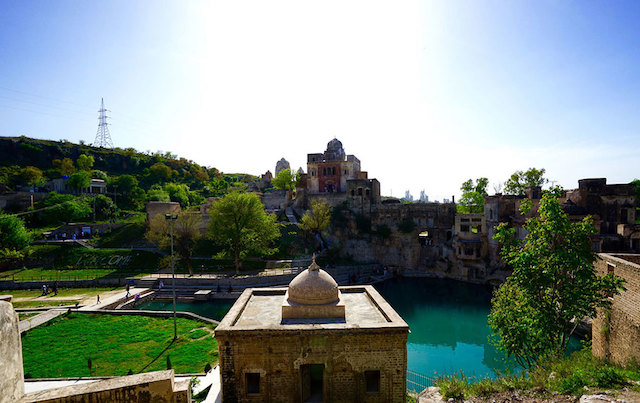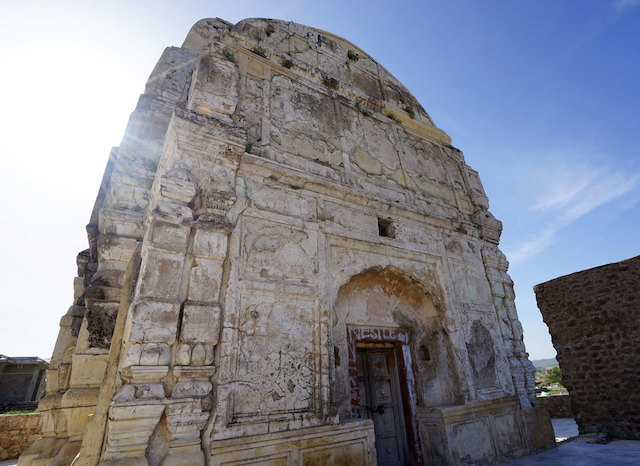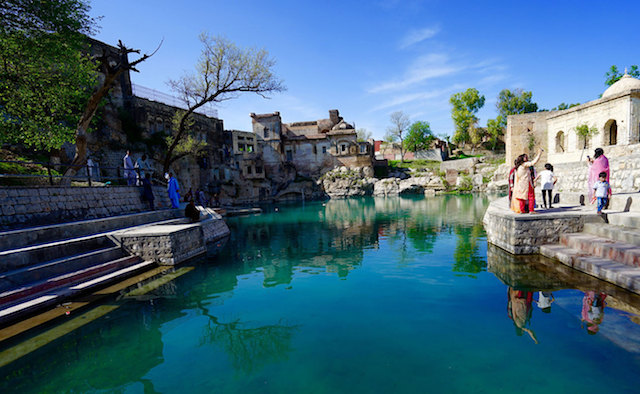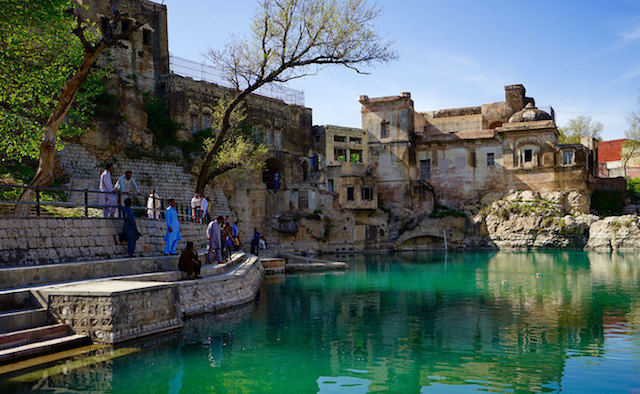Katas Raj temples: Pakistan









This is a collection of articles archived for the excellence of their content. |
Contents |
Location: Chakwal, Punjab, Pakistan
Nefer Sehgal, Dawn, July 30, 2016
December 12, 2017: The Hindustan Times
The Katas Raj temple in Chakwal district of Punjab province is one of the Hindu community's most well-known places of worship. The name 'Katas' is derived from Kataksha, a Sanskrit word meaning 'tearful eyes'.
The place has a unique historical connotation as it is said that Al Biruni, the Persian scholar and polymath, during medieval times had computed Earth's circumference from here.
Spreading its beauty near Chakwal in Punjab province of Pakistan, the most reverenced among all the temples are the Katas Raj Temples. In a heaven like surrounding, complex of temples stands in homage to the deities of Hindu mythology.
The Katas site houses the Satgraha or seven temples, a gathering of seven old temple, remains of a Buddhist stupa, a couple of medieval sanctuaries, havelis and some as the newly built sanctuaries, scattered around a lake considered sacred by Hindus.
The sanctuaries at Katas are mostly developed on square platforms. The elevation of the sub shrines seems to form a series of cornices with small rows of pillars, crowned by a ribbed dome.
According to Alan Cunningham, the first Director General of the Archaeological Survey of India in 1872-73 CE, Katasraj is the second biggest holy place in Punjab for Hindu pioneers after Jawala Mukhi. It is said prominent Pandwas brothers lived 12 years in Katas and assembled the sanctuaries of Satghara.
Katas Raj, a conglomeration of temples preserves at least 1500 years worth of history ranging from Buddhist era to British rule in that particular space.
Maintenance
2017: Renovation
Pakistan to renovate Katas Raj temple, Jan 12, 2017: The Hindu
Mubashir Zaidi
Pakistani Prime Minister Nawaz Sharif visited the Katas Raj Hindu temple in Chakwal district of Punjab to inaugurate its renovation. The work includes installation of a water filtration plant in the Amrat Jal area.
Mr. Sharif said his government was pursuing a policy to establish Pakistan’s identity as a minority-friendly country.
“Salam, Namaste, Sat Sri Akaal and good morning to all my brothers belonging to different religions,” the Prime Minister told a cheering audience.
“I am the Prime Minister of all Pakistanis ... be it a Muslim, Hindu, Sikh, Christian or [those of] any other religion. You are all equal,” he said.
The Katas Raj temple is revered by Hindus across the globe as legend has it that the foundation of the sacred site was laid by Lord Shiva. Mr. Sharif said the temple was over 5,000 years old and had been the focal point of four civilisations. Al-Biruni, Persian scholar and polymath, had computed the earth’s circumference from here.
The Prime Minister said all efforts must be made to restore the temple to its original glory. He had directed the chairman of the Evacuee Trust Board to preserve, renovate and expand holy places of various religions.
Mr. Sharif said there was an upsurge in the economy and his government had undertaken development activities in every nook and corner of the country.
The Pakistani Minister for Religious Affairs and Interfaith Harmony, Sardar Muhammad Yousuf, said his Ministry had instituted special funds for the welfare of the minorities.
November 2017/ SC: Pakistan failed to save the temple's pond
Mian Saqib Nisar, Chief Justice of the Pakistan Supreme Court has criticised the government of Punjab province for its failure to safeguard Katas Raj temple, one of the most revered places of worship for Hindus in the country.
Suo motu notice
The Supreme Court had taken suo motu notice of the case last week after reports published in local media that Katas Raj temple pond was drying up as cement factories and settlements in Katas and Choa Saidan Shah were drawing water through borewells.
“Katas temple is not just a sacred place for the Hindu community, but also a part of our cultural and national heritage,” the Chief Justice observed.
The Punjab government in a report submitted in the Supreme Court earlier this week admitted that an aquifer feeding the pond at the temple complex is facing a drastic fall in the water level due to boring of tube wells by a cement factory.
The Chief Justice directed the Punjab government to establish a high-level committee to probe the matter and also issued a notice to the cement factory.
Alternative water supply
Justice Nisar also asked the authorities to find a substitute water supply scheme to spare the pond. “We have to find a solution as to how water can be provided. If we need to close down tube-wells or halt the water consumption of the factories, we will do it,” he said.
Hindus believe that Katas Raj pond was formed after Lord Shiva wept on the death of Sati, his wife.
December 2017/ Missing idols
The Pakistan Supreme Court expressed its concern over the absence of statues of Lord Ram and Hanuman at the Katas Raj temple complex in Punjab province’s Chakwal district.
The court was hearing a suo moto case it had taken up on the basis of media reports that the sacred pond at Katas Raj was drying up because nearby cement factories were drawing large amounts of groundwater through a number of wells.
Justice Ejaz Afzal Khan questioned the Evacuee Trust Board Property (ETBP)’s counsel whether the statues are with the institution or had been sold off. The ETBP looks after places of worship of those religious communities whose numbers are so low that they cannot afford the upkeep of places of worship.
The board’s counsel said there had been massive financial irregularities during the tenure of former chairman Asif Hashmi. “He did massive corruption and left the country,” the counsel said, to which Chief Justice Saqib Nisar questioned why Hashmi has not been arrested.
Nisar further said that the court will not leave the issue till concrete action is taken. He also inquired about the names of cement factories located nearby the temple, terming them as “destructive”.
In November, Nisar had flayed the government over its failure to protect the temple — one of the Hindu minority’s most revered places of worship. He had said that Katas Raj was a national heritage site and must be protected and ordered that a committee be set up to probe the issue.
December 2017, SC/ Cement factory to refill the pond
Pak SC orders cement factory to fill Katas Raj pond in a week, Dec 14, 2017: ANI
Chief Justice of Pakistan Mian Saqib Nisar ordered the Bestway Cement Factory to refill the Katas Raj pond within one week, during the hearing of the suo motu case on the depletion of the pond located at the site of Hindus in Chakwal.
The historic pond is said to have deplet ed due to the presence of nearby cement factories which have sucked out the underground water.
Katas Raj is the second-most sacred Hindu site and dates back to 600 AD.
The temple complex is built around the pond, which finds it origin from Katak Shah, which in Sanskrit means 'raining eyes'.
The pond is believed to have been formed from the tears of Shiva after the loss of his wife, Sati.
The Supreme Court bench is conducting a suo motu hearing based on media reports that the Katas Raj pond is drying out due to water consumption by nearby cement factories.
There are two temples within the premises of the Katas Raj -- Hanuman temple and Sri Ram Mandir.
Earlier on December 13, the Supreme Court of Pakistan expressed shock when it came to learn that the idols were missing from the Hindu temples in Katas Raj temple complex.
The pilgrims who visited the holy site had to bring their own idols to perform their rituals.
The Supreme Court had sought an explanation from the Evacuee Trust Property Board (ETPB) over the absence of idols.
2018: Cement firms to arrange another water source
The Pakistan Supreme Court closed the Katas Raj temple pond case after cement factories in its surroundings proposed that they would arrange an alternative water source for the pond and pay for the water they use until then.
The SC had taken suo motu cognisance of media reports last year in November that the Katas Raj pond, located in Pakistan’s Punjab province, was drying up due to unabated extraction of underground water by cement factories. Bestway Cement and Dera Ghazi (DG) Khan Cement proposed that they would submit $2 million — $1.5 million by Bestway and 0.5 million by DG Khan — as bank security until the construction of a small dam in the area, the outflow of which would be maintained in a way that the pond was not affected. They also suggested paying the Punjab government for the water they would use until then.
A bench, headed by Chief Justice Saqib Nisar, wrapped up the case. The court is yet to pass an order expressing formal acceptance of the proposal of the factories.
Justice Nisar warned the factories to improve the system of smoke exhaust, keeping in view global standards. “If needed, the court will have the smoke exhaust system checked,” he said.